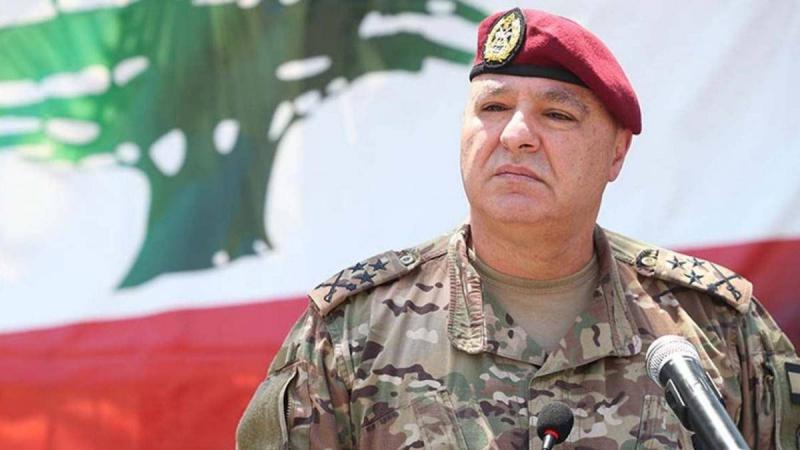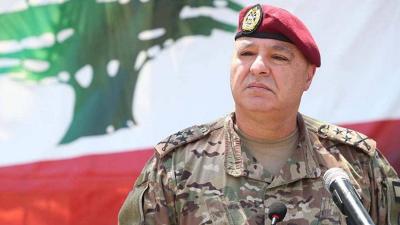In light of the ongoing confrontations between the resistance and the Israeli enemy at the southern border, senior officials in both the legislative and executive branches of the U.S. government are focusing on the relationship with the Lebanese army. They show additional interest in the army's situation and the leadership's stance on various developments. Notably, during Army Commander General Joseph Aoun's recent visit to Washington in June, discussions detailed what the Americans refer to as the terrorism file, alongside the Syrian refugee issue. The incident of gunfire at the U.S. embassy heightened their concerns about the presence of terrorist cells.
According to reports obtained by "Al-Akhbar," which included the presence of Aoun’s advisor, retired officer Wassim Halabi, Aoun heard from Michael McCaul, Chairman of the House Foreign Affairs Committee, that support for the Lebanese army is a significant investment for the United States, evidenced by the recent events at the U.S. embassy in Beirut and how rapidly the army protected the building and apprehended the attacker.
The Syrian refugee issue was central to discussions, with U.S. officials questioning General Aoun about reports of forced deportations of Syrian refugees carried out by the Lebanese army. A group of Syrian opposition members had previously contacted U.S. congressional members requesting pressure on the Lebanese government and military forces for allegedly handing over Syrian opponents to the Syrian government under the pretext of violating residency conditions in Lebanon. They demanded a list of all those involved in these actions and called for U.S. punishment against them.
General Aoun prepared a file regarding the Syrian refugees. In his address to the Foreign Affairs Committee, he stated that Lebanon hosts around two million Syrian refugees in addition to approximately 300,000 Palestinian refugees. He emphasized that camps housing Syrian refugees are fertile ground for extremists and terrorists, posing existential social, economic, and security risks to Lebanon. Aoun clarified that the army's role is to prevent Syrians from entering Lebanon illegally via the border, and the General Directorate of General Security is tasked with coordinating with the UN High Commissioner for Refugees (UNHCR) regarding various classifications between those holding legal residency, those recognized as refugees, and illegal displaced persons.
Aoun mentioned that there are inaccurate claims in the media and on social media accusing the army of human rights violations, stating that 40% of incarcerated individuals in Lebanese prisons are Syrians. Regarding the shooting incident at the U.S. embassy, Aoun indicated that the perpetrator was a Syrian national who had been in Lebanon since 2013 and was influenced by ISIS ideology for about two years, although he was also affected by events in Gaza. The preliminary investigation revealed a connection with an ISIS group in Iraq, and the army's intelligence department had uncovered and apprehended several ISIS cells in northern Lebanon in recent months.
In response to Jim Gattilla's question about whether terrorist cells operate under ISIS or independently, Aoun noted that the modus operandi of these cells had been more complex and better equipped logistically in the past compared to current groups, which he assessed as possessing primitive capabilities and lacking sufficient funds to purchase advanced explosives, although they are currently influenced by events in Gaza.
When asked about the situation if internal security forces took charge of Beirut's security, Aoun replied that the army is actively engaged in combating drugs, terrorist cells, and illegal immigration, confirming that the Lebanese army's role is to protect the Lebanese borders. He reiterated that the Syrian refugee file poses a significant danger. Many come to Lebanon due to funds provided by NGOs and UN organizations, and some benefit from these funds while residing in Syria. He mentioned that many Syrian refugees participated in recent Syrian presidential elections held at the Syrian embassy in Lebanon, which indicates they do not meet the refugee criteria.
Aoun described the ground situation as very difficult, characterizing them as a ticking time bomb and a threat to Lebanon's stability. He claimed that the UNHCR does not cooperate with the Lebanese state and does not provide data on Syrian refugees to Lebanese authorities, complicating the crisis further.
Robert Karem, National Security Advisor to Republican Senate Leader Mitch McConnell, expressed that prior U.S. administrations failed to resolve the Syrian crisis, while Arab nations have decided to engage with President Bashar Assad, despite ongoing drug smuggling and terrorism emanating from Syria and Assad’s support for Iranians operating freely throughout Syria. However, Aoun did not directly respond to Karem's question about the outcomes of the Arab approach to President Assad.
The actual position of the U.S. administration was evident in the meeting with Ambassador John Bass, Under Secretary of State for Political Affairs, where he discussed the Syrian refugee file in detail, expressing Washington's interest in knowing whether the current situation is sustainable in the long term. General Aoun reiterated his views on the refugee issue, highlighting reports that UNHCR-distributed salary payment cards were intercepted with a Syrian detainee who had traveled from Syria to Lebanon, showing cards belonging to Syrians in Syria pretending to be refugees in Lebanon while receiving aid from UNHCR. He also mentioned apprehending an individual found with an app monitoring Lebanese army movements to facilitate smuggling operations.
However, Ambassador Bass appeared unconvinced by the army commander’s statements, expressing regret that the issue had turned into a profitable trade, warning that if the Lebanese army participated in mass deportation operations, it would have a negative impact in Washington.
In a meeting with Congressman Darin LaHood, the latter reiterated inquiries regarding the situation at the Lebanese-Syrian border, arms and drug smuggling, and how to stop arms supply to Hezbollah. The army commander responded that the Lebanese-Syrian border is extensive and cannot be fully monitored and controlled, but significant efforts are being made to combat smuggling, achieving an 80% success rate. The Syrian displacement is a fundamental element and major challenge as Syrians cross into Lebanon to benefit from funds from the UNHCR or attempt to illegally cross the sea to Europe.
A discussion on the trade and smuggling of Captagon pills arose between the army commander and U.S. Foreign Affairs Committee officials. Advisor Gabriella Zach inquired about Captagon trafficking from Syria to Lebanon and how it is being combated. She referred to Captagon legislation aimed at disrupting and dismantling the production and trafficking of drugs. Aoun responded that the army is tasked with combating the production and smuggling of drugs, particularly Captagon, indicating that this trade has become much more challenging in Lebanon as the army has dismantled drug production facilities, bringing 90% of production and smuggling operations to a near halt.
Richard: Is there a link between Hamas and ISIS?
Elizabeth Richard, the U.S. State Department's Coordinator for Counterterrorism, previously served as the U.S. Ambassador to Lebanon from 2016 to 2020, actively engaged during critical phases of the fight against ISIS in Syria, Iraq, and even Lebanon. She had requested President Michel Aoun and the Lebanese army leadership not to participate in the clearance of ISIS terrorists from the eastern mountain ranges, although in informal meetings, she reflected a different stance, with a close friend of hers stating that she said she couldn't understand Washington's thinking but could never deny that Hezbollah was at the forefront against ISIS in Lebanon, Syria, and Iraq as well.
Richard, who was appointed last year, met with Army Commander General Joseph Aoun during his recent visit to Washington, where the main agenda item concerned ISIS organization. She opened the meeting with a statement about belief long held that they had the organization under control, noting that this year marks ten years since the establishment of the international coalition to defeat ISIS and five years since the toppling of the territorial Islamic caliphate. However, she pointed out that the problem is not limited to enforcing the law, as ISIS followers have shifted to other types of activities.
Richard added that they believed they had contained the organization in Iraq and Syria, yet it has resurfaced, with information suggesting that organization members are communicating with individuals from Afghanistan and Pakistan to recruit them, as well as with Tajiks moving around Moscow, highlighting the danger presented by Syrian refugees and Palestinian camps in Lebanon. She abruptly jumped to ask General Aoun whether there is a connection between ISIS and Hamas in the Palestinian camps.
In response, the army commander stated that there are 12 Palestinian camps in Lebanon linked to the Palestinian Authority, and the army monitors these camps, but they are not permitted to enter them. There are small groups in Ain al-Hilweh camp linked to ISIS. Weapons have been seized in one of the Syrian camps around Arsal, and ISIS supporters can communicate online or through phone apps.




